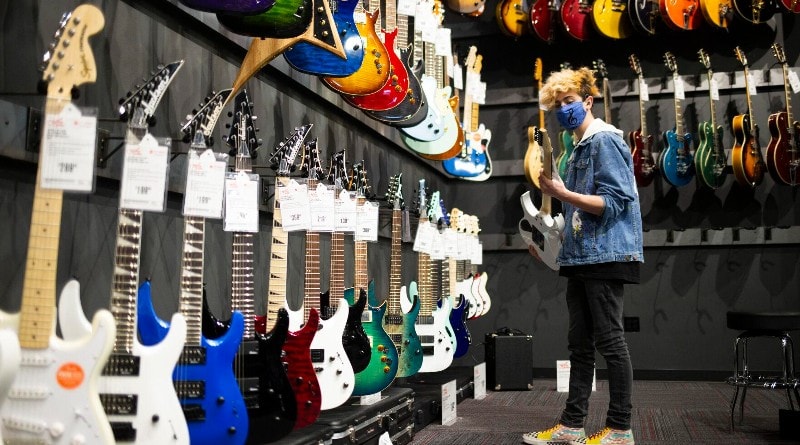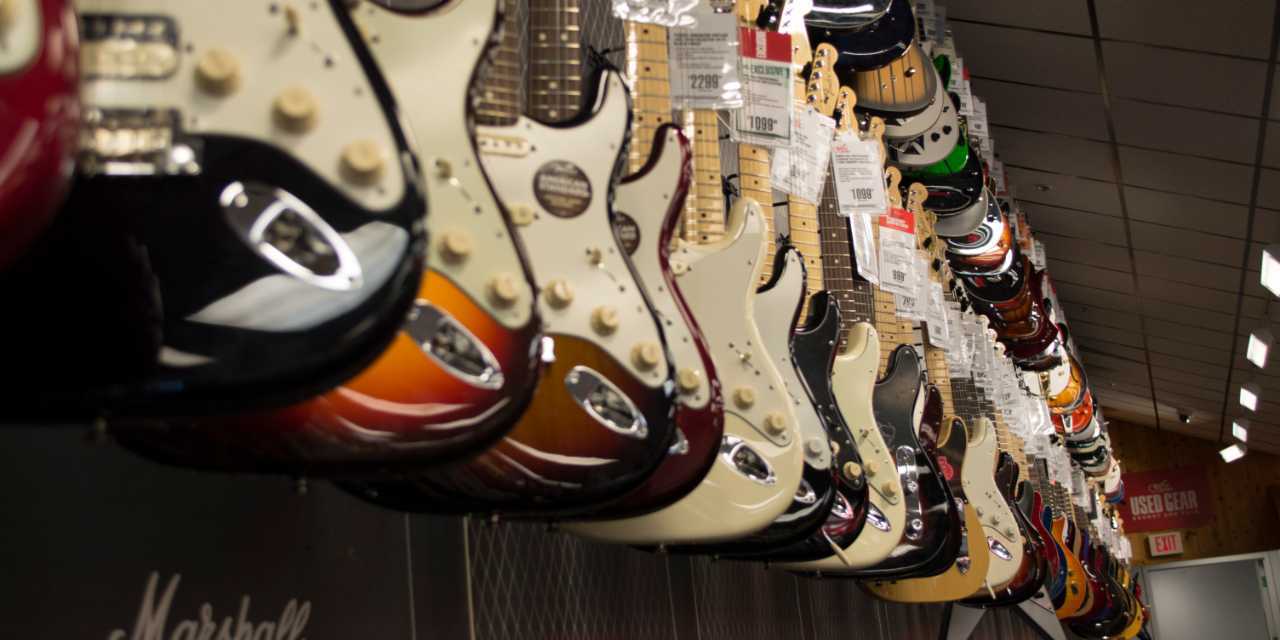If you’re considering an upgrade for your guitar, you’ll be pleased to know that it’s extremely easy to trade in your old model for something new at Guitar Center. Love them or hate them, Guitar Center stands as one of the last remaining nationwide big box guitar stores, making them the de facto choice for a huge number of players who want to buy, sell or trade guitars.
Guitar Center’s trade in program is probably the single most convenient solution around for musicians looking to exchange their old gear. There are stores in most major cities, and the procedure is consistent, and generally pretty painless. Of course, you’re not likely to get maximum value this way, but if an easy transaction is what you’re looking for, you’ll find it there.
The trade in program offers the additional incentive of discounts on new merchandise. By swapping your gear for store credit, Guitar Center may offer reduced prices on the new guitar you’re looking for, which goes some way to making up the loss you sacrifice for convenience.
This approach not only benefits you financially, but can also promote a more sustainable approach to guitar buying. By trading in gear, you’re contributing to a full circle economy where guitars and other gear are reused and enjoyed by others, which has the additional benefit of reducing waste and lowering environmental impact.
In this KillerGuitarRigs Guide, we’ll be taking an in depth look at the Guitar Center trade in program to learn how its simplicity and convenience, coupled with its eco friendly aspect, make it a great option for everyone from beginners to pro musicians.
Looking to buy a guitar online?
Check out our full guide to online guitar retailers.
Contents
How the Trade In Process Works

Trading in at Guitar Center really couldn’t be easier. Not only are their stores conveniently located across the entire country, but there’s no waiting for appraisals – the offer you get will be immediate, and you can accept or decline on the spot. If you walk away to think about it, you won’t be penalized, as their valuation process is consistent across the board.
The first step is to take your gear to a Guitar Center store. We’ve found that it’s always a good idea to call ahead to make sure that someone with the authority to make offers on gear is in the store at the same time you plan to go. You don’t need an appointment as such, but as with the rest of the retail industry, staffing levels can be low, and you might find that you’re waiting for quite some time to be seen if you don’t let them know when to expect you.
Approach the register or customer service desk and let an associate know you’re looking to trade in your guitar, amp, or whatever other gear you’re looking to exchange. The associate will take it from you, and give it a visual inspection, and will plug it in and try it to make sure it works as expected.
From there, they will go to their store computer to look for “Comps” – or comparative values based on make, model, market demand, and general condition. Once this is established, they’ll make you an offer on the spot.
When it comes to payment, Guitar Center provides two options – immediate store credit or a check. Store credit is usually a more lucrative option, as it can actually exceed the cash value and can be used for any purchase within the store – ideal if you’re looking to get something new right away.
Unfortunately, there’s little to no wiggle room on the price they offer, especially if you’re going with a direct sale rather than a trade. Although, with trade ins they often have special deals on upgrades. Regardless, if you fancy your hand at a bit of negotiation, you’re welcome to try – you might even walk away with a set of strap locks!
What Can You Trade In?
There’s no shortage of things you can trade in at Guitar Center. Of course, they’ll take guitars and amps, but they’ll also accept microphones, drums, cymbals, bass guitars, keyboards, and recording gear, too. However, you should note that there are certain items that Guitar Center might not accept due to factors like market saturation/low demand, or too low of a potential resale price – cables are a great example.
Heads up – If you have a nice case or gig bag for the guitar you’re trading in, don’t worry too much about including it in the trade. In almost all cases, they won’t give you anything extra for the bag or case, and might actually just ask you to take it home.
If you’re looking to trade in a vintage or rare item, you’ll need to proceed with a bit more caution before trading at Guitar Center. The associate you deal with may not be a guitarist, and might not really know what it is they’re looking at. This could potentially lead a drastically lower offer than the real worth. Again, this is why it’s a good idea to call ahead to make sure you can go to the store when an experienced associate is available.
How Much Will You Get for Your Gear?

To be absolutely clear – when it comes to selling to, or trading in your gear at Guitar Center, the store almost always wins. The convenience of immediate cash or store credit is the premium they charge. You’ll get far more for your gear if you sell it independently directly to another buyer.
Having said that, if you are looking for that immediate trade in convenience, the amount you’ll get depends on a number of factors. The physical condition of your trade in is the first thing the store associate will look at, together with its functionality, as well as the overall demand.
The rule of thumb in terms of the dollar amount you’ll get for your trade is 60% of market value. If similar guitars to yours, of a similar age and condition are selling for $1000 on the open market, Guitar Center will most likely offer you $600 in store credit or cash. In some cases where they have Trade In Trade Up offers on, they may offer additional store credit above that threshold when you purchase a specific new model.
If there are no specials running, the standing offer at Guitar Center is generally a 10% discount on new merchandise when you accept store credit. You cannot get this discount on their used guitar selection.
Preparing Your Gear for Trade In
To maximize the value of your gear when trading in at Guitar Center, make sure you prepare properly. Start by cleaning your instrument or equipment thoroughly (including fretboard gunk!). If your guitar is covered in stickers, we also recommend taking those off and cleaning away any residue to help create a better first impression.
It might not seem logical as you’re trying to get rid of it, but we’d also suggest sticking on a set of fresh (cheap) strings on any guitar you’re trading if you can. If you show up with a dirty guitar, with rusty strings, Guitar Center will almost certainly categorize it as “fair” or even “poor” condition, and lower their offer.
A well maintained appearance really can make a significant difference in the appraisal process. Check for any minor repairs that you can manage yourself, like ensuring all knobs and switches are present and functioning correctly, that tuning machines turn freely, and that accessories like tremolo arms are included.
Negotiating Your Trade In Value
Negotiation is a tough task at Guitar Center. The offers they present are generally take it or leave it, but if you do want to haggle, you’ll need to negotiate effectively. Start by researching the current market value of your gear. Online marketplaces, auction sites, and other music stores can give you a benchmark for what your guitar or other gear is worth. Armed with this information, you can enter negotiations with a realistic expectation of the value of your gear.
Timing also plays a significant role in negotiation. The demand for certain types of gear can fluctuate based on trends, seasons, or even upcoming events. Having an awareness of these factors can help you choose the best time to trade in your gear for maximum value.
If you’re trying to negotiate, communicate clearly and confidently about your gear’s condition and value, and what it is you want to get out of it. Be honest about any flaws or damage, as these will likely be noticed during the assessment. It’s also important to make sure they’re aware of any unique features or upgrades (improved pickups for example) you’ve installed that might increase its value. Understand that the value of upgrades won’t net you anywhere close to what you’ve paid for the parts, but can potentially raise the value of the instrument as a whole.
Pros and Cons of Trading In at Guitar Center
As mentioned, there are positives and negatives of trading in your gear at Guitar Center.
Pros
- You’ll most likely get an instant cash or store credit offer
- There are lots of Guitar Center locations to visit all over the United States
- They have a large selection of new gear to choose from and take away the same day
- You might get a discount on the new gear you’re interested in trading for
- It’s an extremely safe way to sell, and you won’t fall victim to the kind of scams prevalent in online marketplace platforms
Cons
- You will receive 60% or less of your gear’s actual market value
- There is little to no room for genuine negotiation during the trade in process
- Associates taking in trades aren’t always knowledgeable about the gear you’re trading
Environmental Impact of Trading In
If you’re trying to do better with your carbon footprint, trading in your gear to the likes of Guitar Center can have a surprisingly positive benefit. Many players buy new gear and never get around to selling on their old items, and so it sits unused, gathering dust while the newly acquired equipment gets all the play time. By trading in your gear, someone else will purchase it from Guitar Center, which helps to reduce the need for new gear production, and ultimately contributes to a more sustainable industry.
When to Consider Other Selling Options
The biggest benefit of trading in your gear to Guitar Center is, as mentioned several times throughout this guide, convenience. If you’re willing to forego this convenience in order to hold out for maximum value, you might want to consider an alternative trade in or sale option.
Anybody selling unique, rare, or high value vintage gear should really consider alternatives before taking anything to Guitar Center. Try selling on Reverb, eBay, Sweetwater Gear exchange, or even Facebook Marketplace and Craigslist before settling on the fast cash at Guitar Center. It might take longer, but you’ll get much more for your gear, and increase your subsequent purchasing power.
Final Thoughts
Guitar Center’s trade in program isn’t perfect, but it’s a viable option in almost all cases. As long as you’re aware of the downsides, as well as the tips and techniques for increasing the perceived value, and the subsequent offer made for your gear, you won’t get ripped off. It offers flexibility and convenience, and because Guitar Center carries such a huge range of musical instruments and gear, there’s a good chance they’ll have the upgrade you’re looking for to test out and take away the same day.
As with any method of selling gear, it’s still essential to weigh the pros and cons of trading in vs. looking at other selling options. Guitar Center provides a quick process, yes, but private sales will almost always net you higher returns, especially when it comes to specialty or vintage items. By carefully considering the factors we’ve discussed in this guide, you’ll be better positioned to make informed decisions that best suit your needs.
You might also like these related articles:



Thank you Andrew for putting this info together for anyone considering to sell to Guitar Center. I have been buying and trading in several guitars and amplifiers with GC now for 8 years. I’ve found trade in my used gear t o be waaay easier than trying to sell on Craigs List.
How much did guitar center pay you to write this? I don’t know anyone who was ever offered anywhere near 60% of the value of what they were trading in. I’m not saying they are doing anything unethical, they are in business to make money, but let’s not shill for them.
Hi Erik, I think you may have misunderstood what it’s 60% of – say you have an acoustic that you paid $1500 for. It’s used value according to Reverb/Ebay/Etc is $1000 – GC will give you 50-60% of that $1000, or $500 to $600, not 60% of the new value of the item. This is what we’ve experienced and this is what people we know who work at GC say is the baseline. We have no ties whatsoever with GC – just reporting on how it works.
Hope this helps!
Ah, this is “moderated” which means any comments contrary to the big lie don’t get published. Good to know.
Comments are moderated because spam comments vastly outweigh genuine comments, and as soon as you turn off moderation, spammers tell each other and it turns into a hellhole. Sorry you had to wait a few hours before your comment went live – hope it wasn’t too much of an inconvenience!
Great advice. The information in this article is 100% accurate. I’m a long time GC customer too. Thanks!!